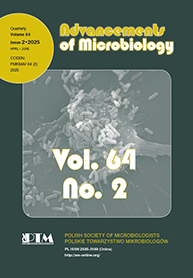CHARACTERISTICS AND REGULATION OF BIOFILM FORMATION IN SALMONELLA
Abstract: The ability to from biofilms, which is a common feature in Salmonella serovars, is the main cause of persistent infections and permanent contamination in both clinical and industrial systems. Because the biofilm structures are significantly more resistant to environmental stress conditions than the planktonic forms of bacteria, it is often impossible to remove them through conventional disinfection or sterilization practices. Therefore, it has become necessary to develop effective strategies in combating biofilms, which are defined as the dominant form of microbial life. To achieve this goal, it is necessary to understand the genetic regulatory mechanisms that control the transition from planktonic form to the biofilm form and the related changes in gene expression. In this review, the current state of knowledge regarding gene regulation systems that affect the biofilm formation in Salmonella, has been summarized and discussed.
1. Introduction. 2. Regulation of biofilm formation in Salmonella. 2.1.csgD. 2.2. BarA/SirA and Csr system. 2.3. PhoPQ and RstA. 2.4. The interaction of cells in the biofilm structures through signal molecules. 2.5. sRNA’s. 2.6. dam and seqA. 2.7.MarT. 3. Conclusion

